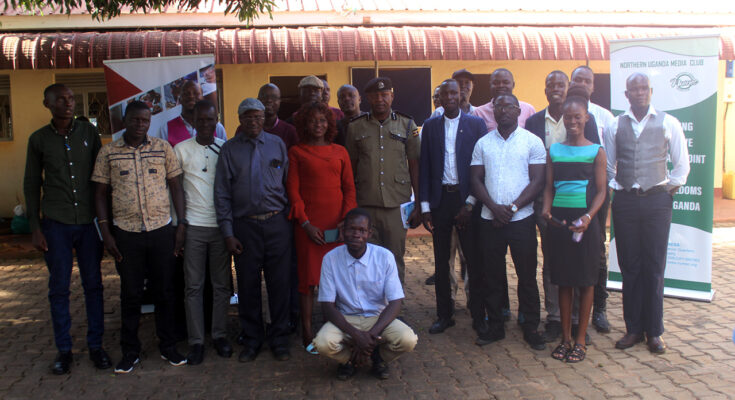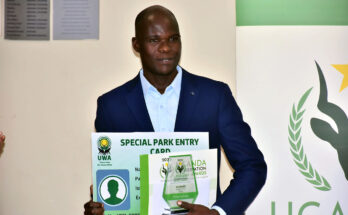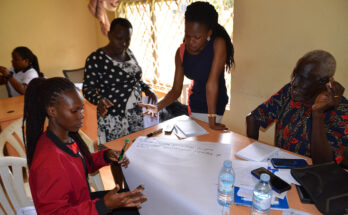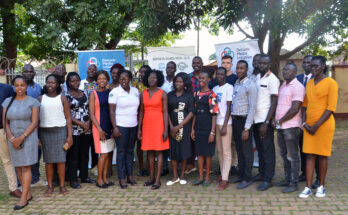As threats to freedom of expression continue to rise, many media practitioners in Uganda are increasingly finding it tough to perform their duties comfortably. In a bid to counter this worrying trend, a total of 20 journalists, drawn from across Northern Uganda, have undergone a one-day intensive training on how to identify practical solutions that can ensure their safety during work.
Organized by the African Centre for Media Excellence (ACME) in collaboration with the Northern Uganda Media Club (NUMEC) in Gulu City, the training focused on both the theoretical and practical experience of journalists to enable them to identify mechanisms that can ensure their personal safety, their sources and the media outlets.
While presenting a research conducted by ACME on the safety of journalists in Uganda, Brian Ssenabulya, the Research and Media monitoring Manager at ACME, tasked all media practitioners to engage in meaningful discussions in a bid to moot various ways of addressing media safety concerns. According to the report, Ssenbulya indicated that the majority of the victims of violation of freedom of expression were male, who accounted for 81%, while women constituted 19% of the total incidents documented.
“We conducted research on the basis of fighting impunity by tracking [down] perpetrators of freedom of expression violations with a view of holding them to account,” Ssenabulya said.
“Majority of the victims were journalists with 61% cases followed by politicians with 21%. Activists came in third place at 9%, while ordinary people and medical interns made up 5% and 4% respectively of the total incidents,” he added.
Alfred Oryem, the Project Coordinator at NUMEC, stated that the training would lay a firm foundation towards creating a network among journalists who can collectively work together to address their challenges and build resilience within the media fraternity.

For years, Uganda’s press index figures have been grim. A 2023 Press index report – which evaluates the environment in which journalists operate in 180 countries – showed that Uganda dropped a place down to 133 from 132.
In northern Uganda, for instance, digital safety has been a big concern too. A survey conducted by NUMEC last year showed that only 40 percent of the media houses in northern Uganda had qualified personnel running digital platforms thus putting outlets without this workforce at risk of cyber-attacks and hacks.
Alfred Oryem, said journalists in northern Uganda are also targeted for covering sensitive topics – such as land conflicts, human rights violations, corruption, politics, and security – adding that they often face intimidation and violence from both the state actors such as security forces and politicians and non-state actors like businessmen, cultural leaders, and armed groups.
“In 2022 alone, NUMEC recorded 32 cases of violations against journalists in Northern Uganda, including physical attacks, arrests, detentions, threats, harassment, censorship, confiscation of equipment, and denial of access to information,” Oryem said.
At the moment, he said, NUMEC has put in place a safeguarding desk, headed by a safeguarding focal person, to receive complaints and also give financial support to journalists with challenges such as legal and medical issues faced during their line of work.
“NUMEC also monitors and documents cases of violations against journalists, maintains a referral directory and advocates for justice and accountability, including legal redress”, Oryem added.
Apollo Kakaire, the Programme Manager, Communications and Advocacy at ACME, cautioned the journalists to take prior precautions while doing their work.

Peter Labeja, a Media Manager at Vision Group also asked the journalists to make their personal safety and security a priority, no matter the story they’re pursuing. He noted that low pay is the biggest challenge of the industry which must be urgently addressed to tackle unprofessionalism and harassment in newsrooms.
The training was also attended by the Uganda Police and the Uganda People’s Defence Forces’ representatives. Fred Kidma, the Aswa River Region Deputy Regional Police Commander, asked journalists to coordinate with security organs when reporting on hotly contested areas such as the Apaa land, an area contested between the Acholi and Madi people.




